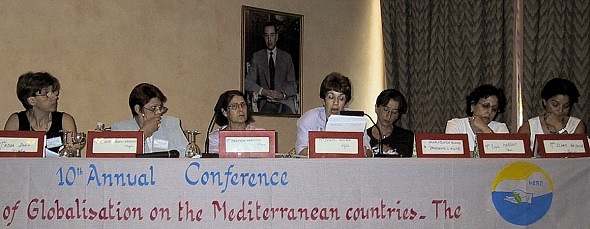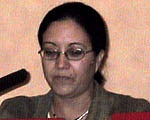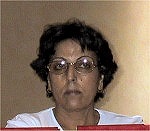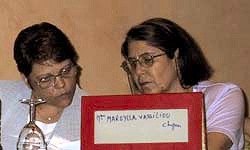AWMR http://digilander.libero.it/awmr/int
AWMR - Association of Women of the Mediterranean Region

10th Annual Conference - in co-operation with the
Association of Human Environment and Development Networks - HERD
The Impact of Globalisation on Mediterranean Countries :
A Women's Perspective
July 12-14, 2002 - Marrakech, Morocco
 Ada Donno (Italy), Ninetta Pourou-Kazantzis, Maroulla Vassiliou (Cyprus), Anissa Smati (Algeria),
Ada Donno (Italy), Ninetta Pourou-Kazantzis, Maroulla Vassiliou (Cyprus), Anissa Smati (Algeria),
Yana Mintoff Bland (Malta),Zineb Mabsout (Morocco), Elham Bayour (Palestine)
1. Introduction
The Conference was conducted in three languages: English, French and Arabic. Mr. Ahmed Hamzaoui kindly undertook to summarize and translate what was said.
The report of the Conference it has been prepared from Ninetta Pourou-Kazantzis
1.1. Dr. Yana Mintoff Bland, Malta
- President of AWMR.

"The Impact of Globalization on Mediterranean Countries : Women's Perspective" was the subject of discussion and a unanimously agreed final statement at the 10th annual conference of the Association of Women of the Mediterranean Region (AWMR) held in co-operation with the Association of Human Environment and Development Networks (HERD) at Marrakech, Morocco from July 12th to July 14th, 2002.
Sixty participants from nine countries engaged in a historical and detailed analysis of globalization enriched by local analyses by academics and activists, women and men, in magical Marrakech.
Mmme Warda, arabic teacher, said:
There is no country where women have won all their rights. Men still act with arrogance, oppression, and lack of communication. Patriarchal, capitalist globalization is primarily negative. The North is colonizing the South, men are colonizing women. We should stop acting as losers. The economy must be at the service of the people- all people, not a small rich minority.
The negative effects of capitalist globalization were studied in three main categories:
- increased inequalities leading to global apartheid;
- increased violence, militarization and wars leading to a reign of terror;
- increased ecological disasters.
Parallel and sometimes opposed to the globalization of capital is the international growth of religious fundamentalism such as Islamic, Christian and Jewish fundamentalism. Their growth and manifestation in instances of violence against women and children in the Mediterranean were analysed.
The third strand in globalization is a grassroots, democratic process that has spread through information and solidarity networks for economic and social justice, access to local and global decision-making, justice, equality, and human rights. This movement is being led by environmental, workers, and women's organizations which share a common critique of capitalism, patriarchy, and fundamentalism.
The importance and uniqueness of the Mediterranean Region was celebrated at this meeting. Mediterranean cultural, historical, and socio-economic heritage has enriched the lives of Mediterranean people over thousands of years. At this crossroad between capitalist globalization, religious fundamentalism and democratic internationalism, between war and peace, the conference participants urged Mediterranean people and Mediteranean leaders to stand together to
- ensure equality between genders, races, and classes;
- restrain imperialism and respect the dignity and sovereignty of each nation
- support the creation of a Palestinian state and re-united Cyprus;
- reduce the role of multi-national corporations and advance sustainable local development, education and welfare;
- make the state a tool for progress and protection of human rights rather than a tool of political, economic, or military oppression;
- create democratic regional and international institutions and promote the role of women in decision making.
1.2. Khadija Al Feddy, Morocco
- President of HERD
Human, Environment and Development Networks
The Conference Opening Speech

Ladies & Gentlemen,
Mr. the President of the urban community of Marrakesh.
Mrs. the President of the Association of Women of the Mediterranean Region,
Mrs. the President of the Moroccan labour association of women.
Mr. the regional coordinator of the committee of solidarity with the Palestinian people,
Mrs. the representative of the Ministry of Youth and Sports.
Mrs. the representative of the Ministry in charge of the handicapped and of women and family affairs,
Dear honourable guests,
Dear colleagues.
On behalf of the association ( HERD) and its staff members, we would like to say welcome all.
We are extremely delighted to have you here amongst us today.
This cultural event is organised by our association in collaboration with the Association of Women of the Mediterranean Region. its members pertaining to different countries along with its regional offices in Malta, Cyprus, Italy, France, Lebanon, Algeria, Egypt, Turkey, and the United States whose support has always been unfailing.
To all, let me express special, cordial and warm welcome in this fabulous city, Marrakesh.
Ladies & Gentlemen,
The choice of Morocco to host this tenth conference can be ascribed to two reasons: First, a concern for geographic mobility. Second, a recognition of Morocco as a very influential and integral part of the Mediterranean Basin.
The choice of Marrakesh is equally revealing inasmuch as it is the city that once hosted the ratification of the GAT convention. Thus , the subject matter of this conference revolves around "The Impact of Globalisation upon the Mediterranean Countries-Women's Perspectives".
Ladies & Gentlemen,
The process of globalisation has always been restricted to circulating capitals, business exchanges, the lifting of customs barriers among countries, access to new technologies, the creation of free exchange zones, and to the political and economic changes, regardless of any political and social repercussions that these transformations may have.
The impact of this process upon women's life-style may be positive or negative. It is determined by intrinsic factors such as: race, social class, nationality, age, the intellectual level and so on....
If globalisation has positive effects upon a certain number of women in terms of the increase in job opportunities. access to up-to-date technologies, and consumption capability, it is, however, for most women, synonymous with hard labour, insecurity, suppression of social services, privatisation of companies, and suppression of jobs.
Ladies & Gentlemen,
We're thoroughly and without any reservations for a globalisation that is fair, more human, and where in the individual's needs are taken into account; a globalisation that protects the individual's dignity, his cultural identity, and his universal human rights. We're, however, altogether opposed to a globalisation that rests on multinational and greedy firms whose main objective is profit-making. This conference centres on the following theme: The Impact of Globalisation upon the Mediterranean Countries - Women's Perspectives.
To scrutinise very closely the social economic, political, ecological, and cultural effects of the New World Order upon the life-style of the Mediterranean women, the participants will present reports on vivid experiences lived by those women. This will, undoubtedly, raise controversial debates that will, on the one hand, yield reasonable alternatives, and bring out, on the other hand, the negative and exploitative aspects of globalisation.
Ladies & Gentlemen,
Our
annual meetings are surely work and exchange spaces designed to
devise a work project that aims at a political and organisational
change. They are also concerned with establishing campaigns of
sensitisation in order to share and deepen our knowledge and
understanding of the matter at issue.
To generate an informative openness and to draw the profile of women's stakes throughout the Mediterranean region and throughout the world, it is incumbent upon us to work collectively so as to formulate a number of alternatives, striving for a genuine economic development and laying down regional and local structures with a view to highlighting and strengthening women's rights.
The world keeps on changing, and I believe that it is high time we had a say in the matter. The era of globalisation, the deep social disparities, and the weakening of the power of local authorities galvanise women into thinking about solutions and contriving new models.
Women constitute 50% of the world population and 33% of the official labour force. They represent 66% of the world total income and possess less than 1% of the world property. These discriminations are not an invention of the New World Order. They are deeply rooted in the drab conditions of inferiority of women that date back to the past. But it seems that the New World Order epitomised by the greedy and multinational firms has no readiness whatsoever to put an end to these discriminations and exploitations. On the contrary, it does its utmost to reinforce those discriminations for they are deemed to be a source of profit.
This is the reality of the exploitation of women. The stakes of the emancipation of women reside in the decrease of the unbridled control of the greedy and multinational firms over the population. Once this source of oppression is dispensed with, the scales will fall from women's eyes.
Ladies & Gentlemen,
The traditional forms of authority in society (the state, the political parties, the religious force, syndicate) are bit by bit fading away and becoming subservient to the big, greedy multinational companies.
If women are excluded and placed on the periphery by traditional authorities, they will be more and more so under the New World Order. The discarding of barriers for free exchange of merchandise and capitals is designed both to exploit the raw materials of Third World countries and to invest in manufactured industries, despite the political independence of Third World nations.
The North-South relations are marked by subordination and dependence. It is the North that has the upper-hand for it possesses all means of production.
It's the North that determines the price for Third World first produce and for the imported products and technology.
The gap grows wider and wider between the increase in the prices of the techniques and products imported by Third World countries and the decrease or at best the stagnation of the prices paid for the products of the Third World.
This simply reinforces the idea that the terms of exchange are dictated by industrial and exploitative countries. The chasm becomes more poignant as the greedy multinational companies work according to concerned plan.
To make more and more profits, the exploitative firms increase the prices of the technology and the products exported to the Third World. Worse than that, the above-mentioned firms' offshoots increase the prices of the products made in Third World countries. Therefore, the Third World economy is deeply affected. Moreover, women cannot escape the negative and drastic impact of the mass media for the latter imposes a certain consumer behaviour.
Ladies & Gentlemen,
World statistics reveal that there are two kinds of worlds: a developed world and a developing one. Nevertheless, the development or rather the enrichment of the countries of the North goes hand in hand with the impoverishment of the countries of the South.. what we have indeed is two different and opposing worlds: a developed, industrial world and an under-developed one. Frankly speaking, the greedy multinational firms have no policy whatsoever respecting the creation and development of jobs.
With respect to the local manpower, the multinational companies are and more concerned with profit-making than with the lot of the labour force . The establishment of those firms in Third World countries has hitherto led to unemployment and is a hard blow to local craftsmen. In this regard, women remain the social category that is mostly affected by unemployment.
Starting from these hypotheses and bearing in mind the promotion of women's rights, the participants will tackle the following questions:
How to rethink globalisation so as to strengthen human rights and women's rights in particular?
What are the advantages and the drawbacks of the New World Order?
2. Plenary
2.1. The impact of Globalization on Women and Children
Chair: Khadija Al Feddy
Human, Environment and Development Networks (HERD)
2.1.1. Professor Hamdani Ben Alì, Morocco.
Consultant of world-wide acceptance

He thanked the organizers and said he would share his experience with them starting by stating that the situation of women and children today is worse than that of men and that the impact of globalization on women and children is enormous.
He gave a historic analysis of globalization and asked the participants to think on that axis.
Globalization was born along with man and is evident in commerce since ever. It has been the exchange between the peoples all around the world. The growth of Navigation in the 14th century and the discovery of Africa and the Americas maximized the effects of globalization and enhanced the movement of populations.
During the 17th and 18th centuries there was nothing to stop the expansion of commerce, trade and external affairs. The new discoveries of that era - cars, trains, communications etc. - played a major role toward this expansion and people benefit from mobility and commerce.
During the 19th and the 20th centuries, there was the industrial development. We call that period "the colonization era" because of the need for raw materials to sustain commerce and production in the "rich" countries. There were many conflicts, a big economic crisis that affected women and children. After 1950 and especially today, steps are taken and institutions are established - like the UN, the WB, the WTO, the IMF, the GATT, the reconstruction of Europe, the EU etc - that are all in favour of globalization.
The economic crisis of the 80's and the defeat of communism in the 90's have transformed the world. In the end of the 90's there was the "economic crisis of the dragon" - the Asian economic crisis. Finally there is the rise of terrorism - up till today. Therefore globalization exists since the beginning of life.
Today, we see the interdependence between countries like France, Italy and Spain.
Cooperation and diffusion of technology are main aspects of globalization.
Communications facilitate the cooperation, and are essential to globalization. It is also essential to spread the technology and knowledge to the third world.
Which are the factors of today's globalization?
Firstly, the investment and private monopolies; secondly, the Multilateral Agreement on the Investments and the GATT; and finally, the Mechanisms of International Jurisdiction, constitute the international face of globalization.
What is the impact and consequences of this globalization? He referred to consequences specifically to Morocco, including the water, the inequality, the unemployment etc.
People today are protesting against globalization in many countries. The establishment of equal diffusion of money, technology and knowledge will result in Justice, Equality and Peace.
2.1.2. Aicha Hajjami, Morocco.
University Professor, Faculty of Law

She spoke on the specific impact of Globalization on Women and Children.
The respect of Human Rights should also secure Women's Rights since in the first article it is clearly stipulated: "no discrimination should there exist between genders". The social systems, the family and the states have to respect exactly that.
The education of women is a primary factor to secure and implement women's rights, which are human and universal rights. The inter-sexual relations are not easy here in Morocco and women's issues are a very complex matter especially due to the system, the religion, the ambivalence of the legal system and the doctrinal opposition for equality between the genders.
The Islamic concept on the family and the status of women dictates that marriage and divorce are controlled by the faith. Women cannot own property. There are also particularities due to the ethics existing in Morocco before the emergence of Islam. The colonization of Morocco, the commerce and national relations during colonization also affected the juridical system. The Moroccan Constitution is very close to the French one and there is a need for reforms. There must be the abolition of discrimination against women.
The respect of Islam is very important in Morocco. So, the acceptance of ways and norms on women coming from abroad create an antinomy. The Human Rights are mentioned and respected in the Islam. Can modern ideas be in conformity or do they always constitute an antinomy with Islam? Cultural specificities have to be accounted for and so should cultural differences.
The specificities in the Islam define Women's Rights, social status, political status, culture, etc. The question is: within globalization, universal culture, etc, can people keep their diversity? Can they remain intact and can women be emancipated without clashing with the sacred texts of Islam? The globalization of Women's Rights can be a positive process and not only a negative one. In her opinion Islam is compatible to women's rights.
2.1.3. Discussion
Myassr Al Hassan, Palestine: She gave an account of her peoples' problems due to globalization. Women and children suffer the most. The USA policy sustains torture, terrorism, poverty etc. The Palestinians ask for an independent Palestinian Sate with Jerusalem as its capital.
Anissa Smati, Algeria: She is a lawyer and a professor on Women's Rights. She told the first speaker that terrorism did not start on 11th September, but it existed for many-many years before. In Algeria they have been experiencing terrorism for the last ten years and it is the USA that perpetuates terrorism since ever. As for the second speaker, she has not mentioned any difference between the North and the South Mediterranean in terms of Globalization and Women's Rights. She also asked what is the positive effect of globalization and said that the speaker did not touch upon the Berber culture and the rights of the Algerians.
Mr Hamdani Ben Ali in response: Terrorism was born hand in hand with humanity. The world is governed by USA. Without colonization, internationalization etc. democracy as we know it today would have been different. But terrorism exists forever.
Mme Hajjami in response: Islam has never imposed on the cultures where it exists. It has always respected differences and specificities, as long as in principle they were not contrary to Islamic Law. As for the Berbers, the woman contributes to the acquisition of riches along with the man, so she is entitled to them too. The Law is different in the various parts of Morocco, but Islam is not a Law Code and there is a need for a uniform Juridical Code in Morocco so that all enjoy the same rights and equality between the genders is secured and respected everywhere.
 2.2.
Globalization and the emergence of Fundamentalist Movements
2.2.
Globalization and the emergence of Fundamentalist Movements
Chair: Idlimam Ali
2.2.1. Aicha Khamass, Morocco.
Lawyer, writer and a woman working for the elimination of violence against women.

The very essential observation is that we have lived in a duality of advantages and disadvantages. The west has brought democracy and human rights but also oppression, war etc. Europe is the epitome of all negative things. We need to understand ourselves before we understand the others. The intellectual maturity comes with the emergence of Prost etc. The Islamic heritage was not in clash with Europe, but because of globalization things have changed.
We react to the incapacity of continuous progress and our fear of change results in the rise of fundamentalism. The abolishment of social services, the deterioration of the middle class, the rise of poverty are some of the negative effects of globalization. More than 10% of Moroccan women live in poverty. The rate of divorce gets higher and today it reaches about 51%. There is a need for a change in the social conditions.
There must also be a change in the status of women. A wide movement that encompasses everybody should be created. Some years ago women's groups were accused of atheism because they asked for their rights. The oppression of women does not perpetuate the family but makes things worse. The politicians just protect the old ethics, but the King has set up a committee to change these situations. The criminal law is also not good in Morocco. There is no recognized theft between husband and wife and this perpetuates injustice against women and inequality in the family.
2.2.2. Sarsar Outar, Morocco.
Writer, HERD member

She gave a report on the real situation of women in Morocco today.
How can women participate in a world that is entirely hostile to the implementation of Women's Rights?
The Arab-Muslim society is peculiar. Women, which constitute more than 51% of the total population, do not enjoy their rights equally in all parts of the world.
2.3. Re-inventing Globalization
Chair: Yana Mintoff-Bland
2.3.1. Valentine Moghadam, Iranian
residing in the USA, Director of Women's Studies and Associate Professor of Sociology, Illinois State University
Reinventing Globalization: A Socialist-Feminist Perspective

Globalization is a contested and a complex phenomenon. Approaches to the study of globalization vary by discipline and by political orientation, and expectations of globalization are varied. Many feel that the current model of neo-liberal economic globalization has very negative effects on people - especially workers, the poor, women, children, and most Third World countries, including the southern and eastern Mediterranean countries. Others - particularly conventional economists, politicians in many rich countries, and those associated with the major global financial and economic institutions such as the World Bank, the IMF and the WTO - argue that it is necessary and desirable, and that it increases interdependence, economic growth and prosperity.
Globalization - the latest stage of capitalism - has given rise to many debates concerning its economic, cultural and political dimensions, and its social implications. Where supporters emphasize convergence, collaboration and integration, detractors stress divergence, competition and exclusion. Among economists a debate has arisen as to whether globalization has increased or decreased poverty and inequalities. The available evidence confirms the growth of inequalities, both within and across countries. Certainly, when one looks at "globalization from above" - particularly its economic dimension - the picture is not a pretty one.
At the same time, the defeat of the MAI in 1998 and the worldwide cycle of protests against globalization since Seattle in late 1999 indicates the emergence of a global movement against such inequalities. Women - and women's organizations - are part of this anti-systemic, counter-hegemonic movement for global economic justice.
Therefore, it is useful to look also at "globalization from below" - globalization not only as a project of capitalist markets, the capitalist classes, and the major international financial and economic institutions, but also as a project of people, that is, forms of global solidarity, organization and mobilization against inequality, poverty, human rights violations and environmental degradation. What is remarkable about the past 20 years is the growth of global social movements, transnational advocacy networks and transnational feminist networks. This is a movement that seeks to reorient globalization away from its exclusive focus on the interests of the international financial and trade institutions and toward the realization of human development and democratic decision-making.
In this regard, it is important to acknowledge the contribution of transnational feminist networks, the socialist-feminist critique of current international financial and trade arrangements and the formulation of an alternative set of arrangements. Demands for "gender justice and economic justice", attention to women's unpaid as well as paid labour, implementation of the Tobin tax on financial transactions, a return to developmentalist and welfarist state policies and women's input into national, and global, economic decision-making processes are critical elements of a socialist-feminist perspective on reinventing globalization.
2.3.2. Cristina Mangia, Italy,
Italian Researcher and Scientist in Lecce.
Gender, Science and globalisation

Science and technology largely support the globalisation process in both top-down and bottom up directions.
First question should be which science we are talking about.
It seems that the modern "western" science based on logic and rationality and isolated form embodied knowledge, is the unique, "universal" form of knowledge.
Unlike traditional, local beliefs of the world, which are socially constructed, the modern scientific knowledge is thought to be determined without any social mediation.
Scientists, making use of an abstract scientific method, are viewed as putting forward statements corresponding to the realities of a directly observable world.
From the beginning, western science affirmed its net separation with humanities, social and economic questions and based its "superiority" on this objectivity.
This dichotomization of the world - reason vs emotion, objective vs subjective, culture vs nature, mind vs matter, public vs -private- had two consequences
- it excluded in the past women from science enterprises, being women identified with subjective, emotion, nature etc,
- identified science with the men.
These stereotypes about gender and science represent the reason why women are still so few in the scientific world, especially in the most industrialized countries and countries with strongest scientific tradition (Science 1994).
The negative impact of the economic globalisation on the lives of many millions of people (mentioned by many others in this conference) requires more and more to reconsider the role of science and technology have, to reconsider its "neutrality".
Social, ethical, environmental problems cannot be solved anymore without new paradigms for a more global and interdisciplinary approach which should overcome the extreme specialisation of single disciplines and mainly the gap between the humanistic studies and the technological ones.
Let us consider the crucial question of the energy use which is fundamental for quality of life.
In 1999 54.1 per cent of the global energy use is by OECD countries, where less of 20% of world population lives.
OECD North America covers the 49.4%, OECD Europe 35.1%, and OECD Pacific 10.5%.
Fossil fuels accounts for some 80 per cent of the world's primary energy consumption with problems from both environmental and social points of view.
In the 1999 there have been CO2 emissions bigger than 20000 MT with serious consequences on climate and environmental system.
Furthermore, the geographic distribution of the world's energy reserves is quite unbalanced, being, for example, more than 65% of oil concentrated in the Arab countries and this could explain many of the conflicts in that area.
So, to re-invent globalization it is necessary to re-think the science and technology and its connection with humanities.
For me, this means also to make the science gender free, which is not only a question on the presence or absence of women in science, but regard the ways in which the images of gender may, however unwittingly, have shaped the scientific enterprise itself that excluded all the cognitive emotional and human resources labeled as feminine.
2.3.3. Discussion
Maroulla Vassiliou, Cyprus: The AWMR has been very active during the World March of Women in the Year 2000 and we were on the organizing committee even though it comprised only 60 women. From Cyprus 80 women went to N.Y. and they came from all political parties.
Anna ..., Amsterdam: This discussion is very important. Globalization started so many years ago, the roots being in the Middle East (Egypt, Sumeria etc) and it is present in all our histories. Western domination is very young, only 500 years old, whilst history in this part of the world reveals our roots of thousands of years. Looking into our history we understand that we have common roots and we can understand each other's languages. We must re-invent globalization but we must find our goals first.
Valentine Moghadam, in response: Unfortunately the Arab and Middle East NGO's are not involved enough in the anti-globalization process and protest. They are not visible and this must change in order for the region to avoid negative impact of globalization in this area. Why the Arab countries do that? Why are they not involved? The women must work this out.
???: Why do we say that women can change the situation when there are many women in charge of big multinational companies today?
Valentine Moghadam in response: The leadership style of women is more inclusive, more democratic, more humane etc. It is very important to have more women because they do make a difference. The 50/50 campaign should succeed because, after all, women are more than 50% of the population. The priorities will change if women are in the leadership - spending will be less on militarization and more on culture, education etc.
2.4. Country Reports
Chair: Maroulla Vassiliou
2.4.1. Elham Bayour.
Palestinian residing in the USA
Western NGOs' Quest in Globalizing Palestinian Women

Palestinian women are caught between the still; existing racist Israeli occupation, the discontents of the so-called "peace" and Palestinian women disappointment by the political direction of the Palestinian Authority's institutional development that emphasizes traditional male leadership, capitalism and globalization and increase their marginalization in political decision-making and economic growth. Western NGOs de-politicized Palestinian women and corrupted their ideology by forcing them to normalize with the Israeli occupiers through what they call "democracy", "building a civil society" and "human rights".
Western NGOs (European, American and Canadian) have been introduced to the Palestinian society under the disguise of donors, promoting: charitable and human rights work, democracy and building up of a modernized civil society. Palestinians know that these NGOs are used as a cover to hide the ugly face of imperialist regimes in the countries of the Third World that suffered greatly from western capitalist colonialism, late imperialism and currently globalization. The other ugly side of the NGO phenomenon came as a new tool for globalization that advocates westernization, which serves as the last development of capital's domination and hegemony over the World. Through this domination, any opposition from local leaders, academics and intellectuals who are not involved or agree with the Oslo Peace Accord were deprived from the finances to the level of alienation that drove most of them to declare "loyalty" to imperialism.
So, the suspicious and puzzling dilemma is that Palestinians are forced to accept this western, unjust tyranny, while they are still under the Israeli racist occupation. They are compelled to execute what the west coerce them to do under the slogan of human rights and normalization with the occupier, despite the fact that these issues are not priorities on the Palestinian people's agenda. This raises doubtful inquiries of the level of these Western NGOs collaboration with the occupier and the degree of their implementing the Jewish State oppression over the indigenous Palestinian population. It is important to note that the term "Normalization" is a new term in the Arabic political discourse and it means normalizing relationship with the abnormal entity, the occupying Jewish State.
Finally, the Western NGOs employ a number of methods to force Palestinian women to normalize with the occupier in an effort to shift their attention from mobilizing and grass-root organizing in order to render them less effective, therefore "normalized" as a way to be "westernized" and late "globalized".
2.4.2. Zineb Mabout, Morocco.

Globalization is a very hotly debated issue. Is it new? Is it American? It is not a democratic process that stems from the will of the people; It is dictatorial; Big Business rules. How does this effect women? Africa is mostly neglected and marginalized, only comprising 2% of the total value of world trade.
Women in African countries face:
- The challenge of education versus illiteracy
- Bad health conditions
- Violence against women
- Lack of participation in decision-making
Today, more education is available and more jobs are open to women, but 75% of Arab women are expected to still be illiterate in the year 2010. We cannot wait for foreign firms to improve this situation.
Women are not the first choice for vacant jobs, and even when women are hired they are paid low wages.
Ecological catastrophes are also faced by women.
War and challenges to elementary security are also widespread in Africa.
Women play a key role in the rural economy and in agriculture in the Maghreb and Africa.
Globalization threatens the agricultural sector. The image of the African woman in the media is distorted - she is portrayed as a consumer and not a producer.
Four recommendations for the Arab Countries to agree upon are paramount:
- Improve the political, cultural and economic situation of women
- Take only what is positive of globalization
- Abolish all forms of discrimination
- Improve education and training
2.4.3. Maroulla Vassiliou, Ninetta Kazantzis, Cyprus.
Globalization and the impact on Cyprus

First, we would like to thank the member organization HERD and its President Khadija Al-Feddy for organizing this Conference on behalf of the AWMR and express our admiration for their beautiful country and gratitude for the very warm hospitality.
Globalization cannot be perceived as the end of a many-years-long process that leads to the eventual triumph of the neo-liberal capitalist model of development. To us, it is a process that aims at the creation of a single world economic area. It is a process that started long ago and indicates the increased interweaving of the goods, services, labour and capital markets. In the whole Globalization process we encounter three phases, which co-exist and are interlinked: First of all, it is "internationalization" which constitutes an objective, comprehensive, socio-economic process. Through internationalization of the market and the regional economic relations, we are gradually being led to the creation of a Single World Economic Space. Then, it is the capitalist globalization that is promoted by the multinational monopolies and is characterized by four principles: freedom of capital movement, freedom of goods movement, freedom of services movement and freedom of labour movement. Last, it is the domination of the multinational companies and the powerful states - mostly the USA - over the dependent and economically under-developed countries. In this sense, Globalization can be perceived as a system of financial subordination and exploitation of peoples in under-developed areas.
Globalization, in the way it is taking place, leads to the redistribution of the coefficients of production, both on a world and on a national level. On the world level, a concentration is observed of technologically and knowledge-centered activities in developed countries and, at the same time, transfer of activity requiring unskilled or low-skilled labour towards developing countries. On the national level a transfer is observed of productive resources from protected activities to liberal ones. These tendencies entail significant consequences, such as increased unemployment and deterioration of the standard of living of the working people and destruction of the so-called "middle classes". The Globalization process creates a competition resulting in a social cost that is loaded on the shoulders of the working people through the reduction of wages and salaries as well as cut of social benefits. A classic example is the transfer of production from rich countries to countries that offer cheaper labour and raw materials.
This is exactly what happened to Cyprus in the last 10 years. We have seen shoe and dress factories close and the enterprises moving to countries like Romania and Syria. We have experienced wage deductions and the social profile is no longer represented by a rhombus but by a pyramid, this meaning the destruction of the "middle class", the higher percentage of people living in lower income and the increase of the wealth of the already rich. The official rate of unemployment rose from 2.1 to 4.3%, but we know this is in reality higher - close to 6%, most of them being women. It is evident that Globalization has weakened our economy and has put our working force in the risk of unemployment or underpayment.
At the same time, Cyprus - wanting to enter the European Union for political reasons - has to comply with the European rules and norms. In the social services and in other areas of state intervention - like in agriculture - the rule of the "lesser state" prevails. We have witnessed cuts in the budgets for social services; we have experienced cuts in subsidies for the farmers and the agricultural products; we are now in the process of privatizing organizations like the Water Board, the Electricity Authority and the Telecommunications, whilst our airports are to become private enterprises for the sake of "modernization".
Nevertheless, we have to admit that, the signing of the GATT Treaty and the founding of the World Trade Organization, on the one hand, and the targeted Multilateral Agreement on Investments on the other, constitute a substantial step towards the direction of capitalist globalization.
As a matter of principle, we are not against Globalization. We are however, against the present form and content of Globalization, which is carried out by the multinational monopolies and the leading circles of the United States. We are in favour of the development of interstate relations and internationalization of the economy that would be built on the basis of equality, national independence, respect of sovereignty, solidarity and cooperation. To set en route a new globalization process that would have as its center solidarity and cooperation of states and peoples, presupposes, of course, radical changes in the internal affairs of that state, the overcoming of capitalism and the construction of a socially just society.
Globalization should result in elimination of poverty, respect of human and women's rights, elimination of discrimination, elimination of injustices and oppression, understanding and peaceful resolution of conflicts. We want a democratic world where the economy serves the people and not the other way around.
We want Justice, Equality and Peace.
Thank you.
2.4.4. Ada Donno, Italy

Speculative finance capital has occupied the leadership of Italy and this is creating a new model for capitalist globalization that is extremely cruel. The power of profit is paramount. Wealth and profit are considered the paramount positive values in our lives. The poor are considered useless. Poor countries are considered inefficient and are marginalized.
When Prime Minister Berlusconi was asked about his concerns for the unemployed and the poor, he answered, "For them, I can sometimes open my cheque-book". The domination of Italy by a few finance capitalists who share this philosophy is extremely serious and it represents a risk similar to the one with Mussolini and Hitler.
2.4.5. Anissa Smati, Algeria.
Women in movement in the EURO-MAGHREBIAN space.

The Algerian family is nowadays in a crossroads.
It will be submitted to deep mutations in the future, when crossing the third millennium and being integrated into the EURO-MAGHREBIAN space.
The changes should be operated on women's status, and the legislation should be revised in this way too.
In fact, the third millennium is bringing values that are not new but nevertheless vigorous.
The reinforcement of women's rights, considering then equal to men;
the rejection of discrimination toward women and the fight against all types of violence to them are irrefutable principles.
Many debates concerning the universality of these values took place and ideological oppositions have been expressed, but the process of women's
emancipation all around the world - even if slower in some regions - gives a view of future tendencies that will unrelentingly consecrate the equality between both sexes.
In ALGERIA and MAGHREB in general, this tendency will be realized when women conditions will be submitted to the EURO-MAGHREBIAN space.
As long as the perception of the Algerian family cell will not cross the national borders, it will stay submitted to the contradictory tendencies that it is facing now; - traditions against modernism - and women's status will suffer from the tensions existing because of this opposition.
In the traditional system marked by religious taboos, women are still considered inferior to men and kept in minority conditions, whereas this discrimination disappears in the work legislation which emblem relies on freedom and equity.
These contradictions can no longer exist in a world that pleads homogeneity between men and women and where each person is considered in its individuality as an economical agent not as a member belonging to a group.
When integrated into the EURO-MAGHREBIAN space, the Algerian family will enter in a multinational dimension: actually, its nature will change and the family members will have the choice to live outside ALGERIA or to have another nationality.
These changes will create new juridical situations that need unified and simplified rules.
The status of Algerian women will, for sure, improve and modern values will replace anachronistic rules.
The mutation of the Algerian family cell has already started, not only in urban areas but also in rural ones; and the family cell is a proof of these changes.
This evolution consecrates women's place in the family and asks the question of her juridical status in the society.
But as we have pointed it above, the woman condition in ALGERIA faces the problem
of the 1egislation's contradiction which submits her sometimes to an
anachronistic system and sometimes to a vanguard order, and this can lead to deep tensions in the family cell.
The Algerian constitution oscillates between these oppositions;
In the one hand, and m affirming in its 2nd article that ISLAM is the
religion of the state, it proves the strong link existing between the
Algerian law and the CHARIA, strengthening -by the way- the family code and giving it a legal statute.
This idea is also expressed in the 9th article part 3 which states that contradictory practices to ISLAM should be avoided by the
institutions.
On the other hand, the constitution in its 29th article consecrates the, equity principle and states that all Algerian are equal in
law refusing thus discrimination especially based on sexes difference.
These contradictions put women in a dilemma:
in onehand, they are submitted to dispositions that admit inequality between sexes.
On the other hand, other dispositions consider them equal to men.
And as a result, this situation gives a consideration and legality to the family code that holds antiquated and discriminatory ideas.
Many examples can be taken as illustration:
The status of minor given to women is no longer in doubt.
If her consent is required to contract a marriage, she must be accompanied by her legal tutor "WALI" who is her father, brother or in ultimate cases the judge.
And the articles 12 and 16 of the family code confirm the minor status of women by submitting them to their husband's authority after
getting married.
This situation will consequently have negative effects on women's relation with their male relatives they will certainly suffer from
discrimination and in extreme cases be plundered from their rights.
Thus, in succession matters, a woman inherits half-part whereas her
brother inherits one part.
For witnessing, a man voice owes two women voices when the 29th article of the constitution claims all citizens equal in rights no matters their race, sex, opinion .....Last but not least, if a man can marry four women, the inverse situation is not possible.
This minimization of women's rights is also evident in divorce
cases.
A man cannot ask for divorce, only her husband does and without
any justification.
She cannot marry a non-Muslim, and if she does her situation has any
legal value.
However, there are some dispositions in the family code that give
women a total liberty in managing their patrimony showing the
oppositions that exist in the legislation.
Marriage is submitted to the separation of wealth regimen and the 38th article gives her the right to trade.
These contradictions are due to the ambiguity that surrounds
the concepts of majority and minority.
Actually, it is important to underline that the civil code gives the civil majority at the age of 19 when the vote is possible at the age of 18.
The other law corpus managing the political and economical life show no discrimination and apply the equity principle.
One of the examples is the work legislation and the law n.90-11 that gives equa1 rights to all workers no matter their sex.
In the educational, political and health fields the discrimination
doesn't exist either.
The question that is asked is whether these contradictions
will not create a conflict that will stop the legis1ation's evolution and spoil all women's chances to gain their freedom.
If this coexistence of contradictions is possible in law, the situation is different in the daily life and the evolution of society imposed by the social and economical changes and overthrows will erase the rules that are inadaptab1e to the modern life, and women's role in society will be enforced.
To this economical and social changes, the impact of values that marked the end of the last century must be added.
Democracy which is an old concept is still having an effect especially on youth;
After the 2nd world war, democracy's objective was to erase the racial discrimination;
The end of the 20th century has been marked by the will of women to fight against all types of discrimination toward them.
In all fields they claimed and still claim their citizenship.
And this has been shown to the whole world in PEKIN'S congress where women from each part of the world met to ask for their rights.
As a result, women's claims have been heard by international instances and Europe is an illustration.
In fact, the European community has sacred the non-discriminatory
principles in its legislation and countries belonging to the community were held to respect this rule.
We can wonder about the fate of the family code that is
contradictory to the equity principle;
The creation and integration of the EURO-MAGHREBIAN space will certainly have incidence on the Algerian and Maghrebian family.
The structure of Algerian family as the others will be characterized by its multi-nationality.
How will different even contradictory juridical situations be managed ?
How can the problem of co-existential different juridical systems in the one family be solved ?
How - when the European community erased all types of discrimination in its legislation - make credible in this region a principle that considers women for ever minor?
How to apply the principles of majority when it varies from a
case to another ?
In which situation will a woman be considered major and will
she become minor when returning to Maghreb ?
Will her acts done in Europe be considered void as they are null in her country ?
If an Algerian woman marries a European non-Muslim man, will she be
authorized to give her children her nationality ?
The Algerian law forbids it and gives the act of transmitting the nationality only to men.
All these questions will have an incidence on the members of a
family that is parted between Europe and Maghreb.
Solutions must be found to avoid complex situations that could
lead Algerian citizens to find shifts to escape from such antiquated
rules.
Tunisia's experience to modify the rules related to family
statute shows that the change is possible.
The contradictions that exist in the Algerian legislation will
certainly disappear under the pressure of women's movements, international instances and with a new economical and social environment where women and the community members will be considered as economical agents.
2.5. The Palestinian Issue
Chairs: Khadija Al-Feddy and Yana Mintoff-Bland
- Ibrahim Abrache, Doctor, teacher of International Law
- Ouassef Mansour, Association for Solidarity with the Palestinian People
- Myassr Al-Hassan, Palestinian, AWMR member
They tackled the problem from a legal viewpoint, because there were foreigners attending. Myassr Al-Hassan gave a speech of reason and an account of the present situation in Palestine. The plenary adopted what was said and expressed solidarity with the Palestinian people.
3. Workshop
3.1. The role of civil society
Coordinator: Yana Mintoff-Bland
First they discussed what Civil Society means.
There are three definitions:
- The Marxist view that Civil Society is dependent on the state, made up of classes and an invention to confuse people
- The World Bank view that Civil Society must fill the gaps where the state cannot do the work, i.e. NGO's to take up the welfare, the education, the health, etc.
- The radical view, that the Civil Society are the people working for the good of others, organizing for human rights and democracy and working to transform the state to a better one.
How can we strengthen civil society?
- The NGO's must grow.
- We need a comprehensive system of rights.
- The state has welfare and development duties.
In Morocco the inconsistency of Law and Human Rights must end. Women must play a better role in education, development and decision-making. Local resources must be under local control. Education for rural women must be secured, the right to free and quality education implemented. There should be more scientific education for women. They must have the Right to equal opportunity at work.
Environment and nutrition, access to fresh water, the right to information, the right to a free and not a bias press must also be safeguarded. Women and progressive groups do organize more in civil society to advance democracy. We demand democracy in the UN and the World Bank, a relief of the debt of the third world countries. Women's Rights must be accepted and applied in all countries.
3.2. Work and globalization
Coordinator: Ada Donno
The spotlight was on the Italian experience. The effect of globalization on the north and south was examined and a general appreciation was expressed. The cultural and economic levels of globalization all over the world are negative; Even the European countries were affected by the negative aspects of globalization. In Italy there is a conflict between workers and the government, especially on issues regarding women. The southern countries had other problems: The unity of the family is lost and the exploitation of women is there. But there are not only negative but positive points too: technology, intellectual dissemination etc.
They recommended the following:
- Nullification of the debt of the third world countries
- Free circulation of people and abolition of European laws stopping immigration
- Participation of women in the decision-making processes.
3.3. Rights of women and globalization
Coordinator: Anissa Smati
Through history we shed light on two periods: First, before World War I, when women's rights were not important and second, after World War II, when women's rights were important and many conferences on the issue were organized.
The problem of Cypriot women was discussed, especially when investors left and went in search of cheap labour outside Cyprus. Women in Cyprus are not fairly paid.
In Algeria and Morocco the rights of women are closely connected with religion. We demand the implementation of the international resolutions without conditions. We ask that women be given all their rights. Respect of women's rights must stem from interpretations away from religion. Arab societies must do something about educating the children and implementing women's rights. Women all over the world are intellectually similar.
4. Final resolutions
4.1. Final statement and recommendations
At the end of the 10th Annual Conference of the Association of Women of the Mediterranean Region on The Impact of Globalisation on the Mediterranean Countries, organised in cooperation with the Association of Human, Environment and Development Networks (HERD) and held in Marrakech, Morocco, July 12-14, 2002, the participants recognise that Globalisation is a historic process that is both "top down" and "bottom up". The main force is the unrestrained capitalistic expansion and in this process the blind power of profit is concentrating in fewer hands and speculative finance capital dominates.
The imposed Globalisation of the Multinational Cooperations - the World Bank, the World Trade Organization (WTO), the International Monetary Fund (IMF) - is undemocratic and exploitative, in search of higher profits, women are exploited and colonized, strategic resources are no longer under local control, welfare services are eroded, poverty and economic injustice increase.
The USA lead "global war on terror" only serves to increase violence and terror. The three main negative effects of capitalist globalisation are:
- Increased violence, militarization and wars
- Increased inequality leading to global apartheid
- Increased ecological disasters
Parallel, and sometimes opposed to capitalist globalisation, is the international growth of Religious Fundamentalism - Zionist and Islamic fundamentalism, which have manifested in many instances of violence against women and children.
The "bottom up" democratic process of Globalisation has spread through information and solidarity networks for economic and social justice, access to global and local decision making, equality and human rights. It is led by women's, environmental, human rights and worker's organizations. Women's organizations, such as the AWMR, WEDO, WIDE, DAWN, and WLUM, share a common critique of capitalism, patriarchy and fundamentalism. On a regional level all these three forces are apparent within the Euro-Mediterranean and Arab sub-regions.
Mediterranean cultural, historical and socio-economic heritage has enriched the lives of the Mediterranean people over thousands of years. At this crossroads between capitalism and fundamentalism, between war and peace, we ask you as our leaders to take the following steps toward cooperation, equal rights, justice and peace:
- Develop a comprehensive system of rights that will advance the status of women and eliminate discrimination between gender, races and classes
- Cooperate to end imperialism in the Mediterranean and in the world and respect the sovereignty of each nation. We offer our solidarity to the women of Palestine, Cyprus, Iraq and the suffering Kurdish and Saharan women in Tindouf camps.
- Reduce the role of the Multinational Cooperations and advance sustainable local development, education and welfare. Reduce the state expenditure on arms and increase it on education.
- Halt wanton destruction of the environment, impose fines on polluters, promote environmental education and sustainable development and preserve our air, land, water and sea.
- Make the State a tool for progress and protection of human rights rather than a tool of political, military and economic oppression
- Promote the role of women in decision-making and recognise women as an essential and integral part of development. Women's rights must encompass all fields and women must benefit all rights hitherto restricted to men.
- Demand democratic regional and international institutions and demand full compliance with United Nations resolutions, in particular by Israel, Turkey and the USA.
The world has to start a new era of peace, democracy and human rights. An era wherein Globalisation and all its aspects help promote social ad economic justice. All cultures must come together so as to build a lasting peace.
Marrakech, July 14th, 2002
ACCEPTED UNANIMOUSLY
4.2. Resolution on Palestine
We, the participants of the 10th Annual Conference of the Association of Women of the Mediterranean Region (AWMR), in cooperation with the Human, Environment and Development Networks (HERD), held in Marrakech, Morocco, July 12-14, 2002, demand an immediate end to the thirty-five years of illegal Israeli occupation of Palestinian land.
There must be an unconditional, immediate withdrawal of the Israeli troops from the occupied territories.
We urge Israel to comply with UN Resolution 242.
We call upon the international community and the United Nations to send peacekeeping forces to protect Palestinian citizens.
Pressure must be put on the USA government to stop its double-standard policies in respect to the Middle Eastern conflict and vehemently condemn the Israeli blatant and inhuman oppression and torture of the Palestinians.
Let there be solidarity all over the world with the Palestinian Women and Children and let us call on our governments, our leaders, to impose sanctions against the Israeli government until it respects the rights of the Palestinian people.
Marrakech, July 14th, 2002
ACCEPTED UNANIMOUSLY
4.3. Resolution on Cyprus
We, the participants of the 10th Annual Conference of the Association of Women of the Mediterranean Region (AWMR) in cooperation with the Human, Environment and Development Networks (HERD), held in Marrakech, Morocco, July 12-14, 2002, demand an immediate end to the twenty-eight years of illegal Turkish occupation of 36% of the Cyprus island. There must be an unconditional, immediate withdrawal of Turkish troops from the occupied territories.
We urge Turkey to comply with all UN Resolutions on Cyprus.
Pressure must be put on the USA government to stop its double-standard policy in respect to the Cyprus Problem.
Let there be solidarity with the Greek and Turkish Cypriot women. We call upon our leaders and our governments to put every pressure possible toward Turkey and USA for a reunited, sovereign, independent Cyprus.
Marrakech, July 14th, 2002
ACCEPTED UNANIMOUSLY
4.4. Resolution on Iraq
We, the participants of the 10th Annual Conference of the Association of Women of the Mediterranean Region (AWMR) in cooperation with the Human, Environment and Development Networks (HERD), held in Marrakech, Morocco, July 12-14, 2002, oppose the sanctions against Iraq and the US preparations to invade Iraq.
The Iraqi people have suffered a decade of inhuman conditions and these should not be exacerbated and elongated.
A peaceful solution to the question of nuclear or chemical arms production within Iraq is possible.
We call on the USA to immediately halt all preparations to invade Iraq and we call on all governments to work toward peaceful and lasting solutions to conflicts, respecting the rights of all people.
AWMR http://digilander.libero.it/awmr/int
document elaborated from AWMR Italia with Linux and OpenOffice.org







 2.2.
Globalization and the emergence of Fundamentalist Movements
2.2.
Globalization and the emergence of Fundamentalist Movements








